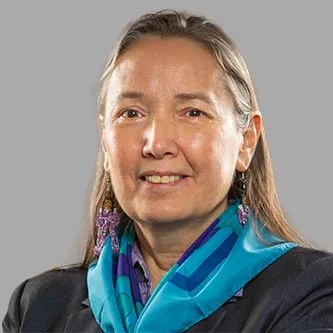Melodi Wynne, PhD is a citizen of the Spokane Tribe and a passionate advocate for Tribal food sovereignty, community health, cultural perpetuation, and Indigenous Birth Justice. Residing on her ancestral homelands on the upper Columbia Plateau, Melodi brings a grounded, community-centered approach to all of her work. Her professional journey has been shaped by her deep connection to community, lived experience as a first-generation college student, and a commitment to building on strength, healing, and perseverance in Indigenous communities.
Melodi came to college after raising her family and working to support her children through their education. While completing her bachelor’s degree at Eastern Washington University, she became a McNair Scholar, which helped her navigate the path to graduate education. Ultimately, she chose to attend the University of Hawai‘i at Mānoa. She was drawn to its Community and Cultural Concentration in Psychology program for its strengths-based and culturally inclusive approach to community well-being. While at UH Mānoa, Melodi earned a doctorate in Psychology, and a Graduate Certificate in Conflict Resolution in the Matsunaga Institute for Peace. The decision to choose conflict resolution was guided by her community—she consulted with several Tribal members, who unanimously encouraged her to pursue this certificate. The coursework on Facilitation for Community Change drew her interest and she spent the one hundred practicum hours learning as much as she could of those skills.
Melodi’s experiences in Hawai‘i were transformative. Through interdisciplinary coursework with international student engagement, she developed a deep appreciation for multiple perspectives and their interconnected beauty. One moment of realization occurred during a class discussion about the film The War of the Roses, when a fellow student from Japan expressed a viewpoint radically different from her own. This sparked a lasting recognition in Melodi that maturity and wisdom come from not only acknowledging diverse perspectives but also seeking ways to connect them. She draws on the Hawaiian metaphor of makawalu—the understanding that any one thing can be seen from at least eight different perspectives, and that true beauty emerges when those perspectives are woven together.
Inspired by this insight, Melodi took courses outside her department and is grateful for the support of her advisers and mentors at UH Manoa. She ventured into courses, and reading, study and discussion groups in Political Science focusing on Indigenous Politics. One pivotal experience was an Indigenous research methodologies course in the Hawaiian Studies department. There, she encountered the concept of mana‘o pono—the deep, reflective consideration of knowledge. She returned home with a strengthened resolve to contribute meaningfully to her community drawing on these profound experiences.
Throughout her studies, Melodi was clear that her path would not lead back to academia full-time. Instead, she leveraged her facilitation skills to join community labor at the grassroots level. She began working with the Spokane Tribal Network, a small nonprofit focused on filling gaps in community services. Initially, she took on projects because they existed, and used her learning, experience, and degree to align the methods and results with her Tribe’s worldview.
Her passion for food sovereignty, ignited during her Graduate Certificate in Conflict Resolution practicum recording for facilitation mentors working with local food advocates. Tribal Food Sovereignty and other justice issues became a driving force in her work. Inspired by Native Hawaiian women who used food as a way to build community, she brought this methodology back to the Spokane Tribe. Since 2021, Melodi has labored in the formal Tribal food sovereignty efforts, starting with small grants and demonstration gardens, and expanding into broader initiatives that address climate change, cultural fire practices, access to traditional lands, and Indigenous birth justice. She has connected food sovereignty to maternal and child health, emphasizing first foods for babies and the cultural significance of nourishing families through traditional practices.
Melodi’s work often straddles the challenging space between community values and capitalist systems. With limited funding, she has had to navigate how to sustain meaningful work while advocating for fair compensation, especially for future generations of Indigenous professionals. She also co-created a program called Life Cycles, based on the teachings of regional elders about Indigenous pathways to health. Despite funding challenges, she and her collaborators continue to share this knowledge in upper Columbia Plateau Interior Salish speaking communities, reinforcing the belief that the work must go on—even if it means finding new ways to sustain it.
Melodi frequently speaks on Tribal food sovereignty, whether in schools, university settings, coalition meetings, podcasts, or conferences. She is a member of the Northwest Tribal Food Sovereignty Coalition’s education group and helped form social media groups that have amplified awareness around food sovereignty. Through her work with the Spokane Tribal Network and beyond, she demonstrates the power of community-driven change rooted in culture, relationships, and a vision for collective wellness.
Her advice to students and emerging professionals: Make your education your own. Step beyond disciplinary silos, embrace diverse perspectives, stay open to opportunities, and hold onto the things that matter to you. Melodi’s story is a testament to what is possible when you stay true to your purpose, even in uncertain or under-resourced environments. Her journey continues to inspire those working at the intersections of cultural knowledge, community resilience, and transformative change.
